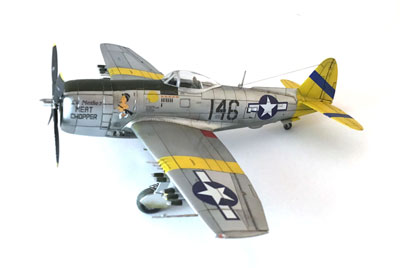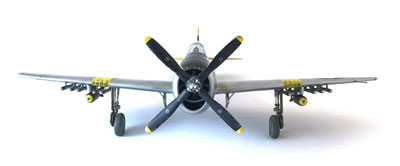|
The Republic P-47 Thunderbolt was built in greater numbers than
any other United Sates fighter in history. That alone attests to
the success of this much storied fighter. When it first arrived
in England, many pilots scoffed at the huge bulk of the P 47,
suggesting that the thing should never actually be able to fly!
For its day, the P 47 was a very heavy fighter weighing 8 tons
fully loaded and especially looked ungainly when parked beside
the nimble Spitfire. But looks could be deceiving. Powered by an
18 cylinder air-cooled Pratt and Whitney engine capable of up to
3,400 HP, the P 47 was no slouch. It was not especially
manoeuvrable, but it could match or better some of the fastest
fighters of the war, especially in a dive. It was also noted for
its survivability, being able to sustain incredible battle
damage and still make it home. There are cases on record where
severely damaged aircraft made it back to base with complete
cylinder heads blown away from the motor. With its eight 50 Cal.
machine guns the P 47 could lay down a withering blast of fire
and it could be armed with rockets and/or bombs up to 2,500
pounds.
In today's jargon, it seems problematic, even embarrassing to
speak in such glowing terms about such efficient killing
machines, especially knowing all the death and destruction that
left many countries in ruin at the end of WW II.. But it serves
us no purpose in denying the realities of war. The history of
war remains an enigma facing the human race to this very day.
With all our modern knowledge, it is indeed puzzling why so many
resources and funds are directed to the efficient manner of
killing one another.
This P-47N was piloted by Lt Oscar Perdomo, 564th Fighter
squadron. Perdomo, was the last “ace in a day” when on August
13, 1944, he downed five enemy aircraft.
|





